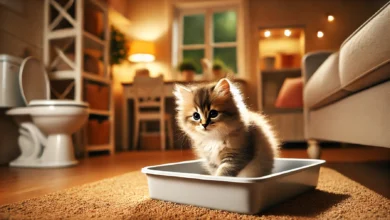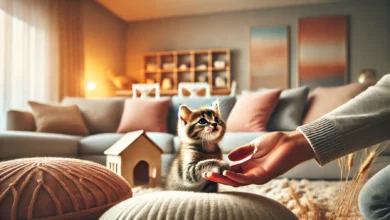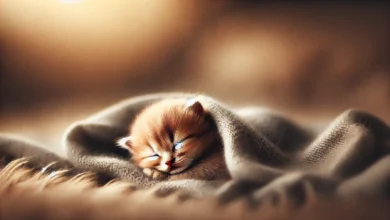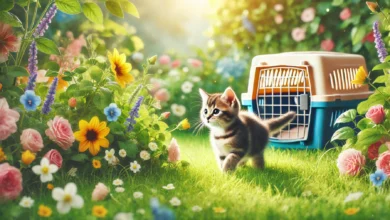Exploring Kitten Behavioral Milestones

Kittens indeed grow up so fast, and every milestone they pass through in life is important to a pet parent when raising a well-adjusted cat.
Every stage of a kitten’s life, from the time their eyes first open to their playful antics, plays an important role in shaping their future behavior.
Whether you’re a seasoned cat owner or a new one, knowing these kitten behavioral milestones will help you support your kitten through early development.
It’s now time to take an in-depth look at some of the major stages in kitten behavioral growth, focusing on how their interactions, play, and learning evolve.
Table of Contents
Introduction to Kitten Behavioral Development
Behavioral development in kittens begins at birth and continues energetically through the first months of their lives.
During these months, kittens undergo many changes: learning to handle their surroundings, developing social behaviors, and discovering how to communicate with people and other animals.
Understanding this early stage will help you provide the right support to your kitten, ensuring they grow into a confident and healthy adult cat.
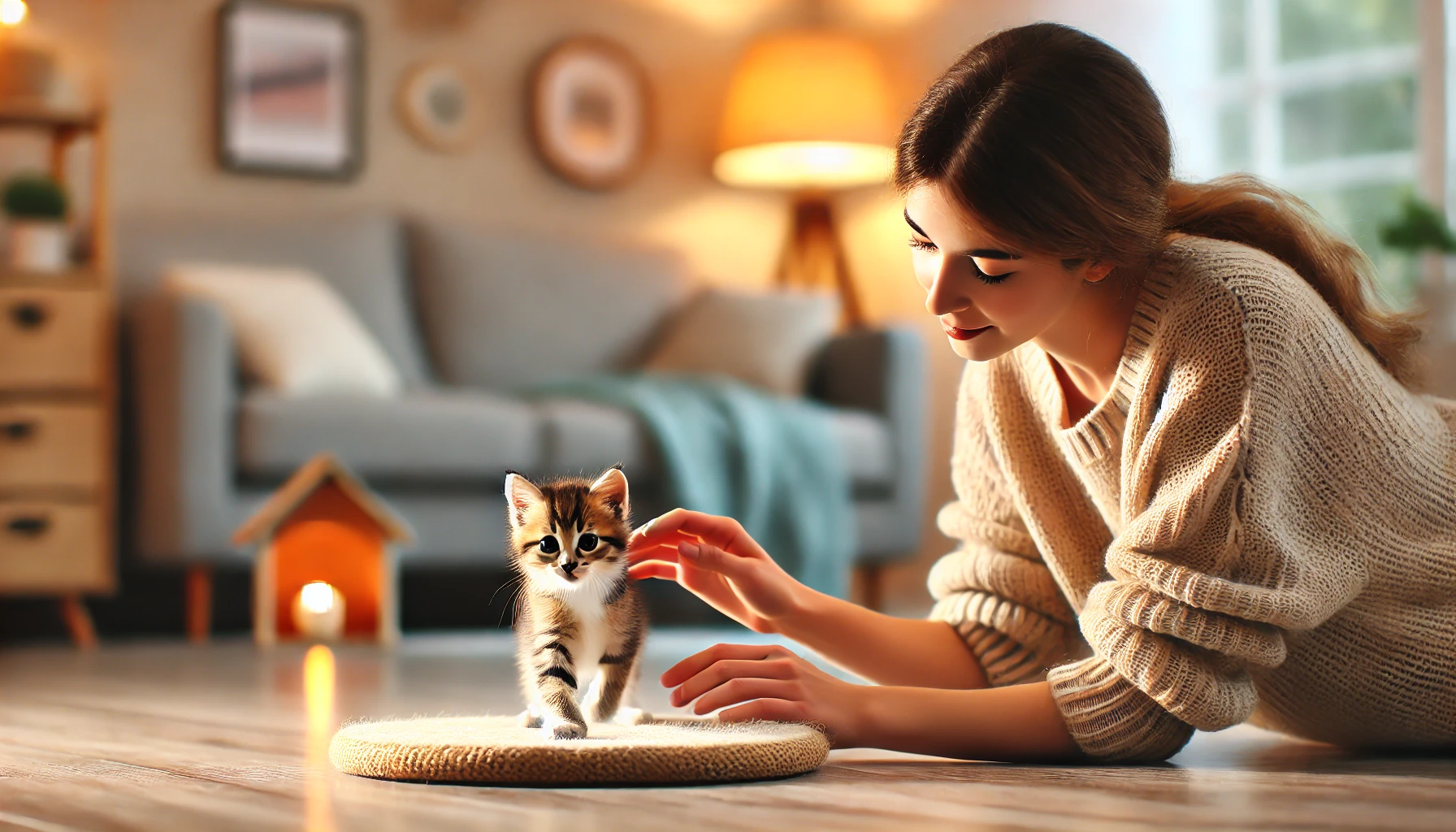
Understanding Kitten Behavior is Important
Understanding kitten behavior at each developmental stage enables you to attend to their needs accordingly.
For example, early socialization helps prevent behavioral problems in adult stages of life.
Kittens that have not been socialized during their early weeks tend to grow into shy, anxious, or even aggressive adult cats.
Recognizing these kitten behavioral stages allows you to take proactive steps that foster good behavior.
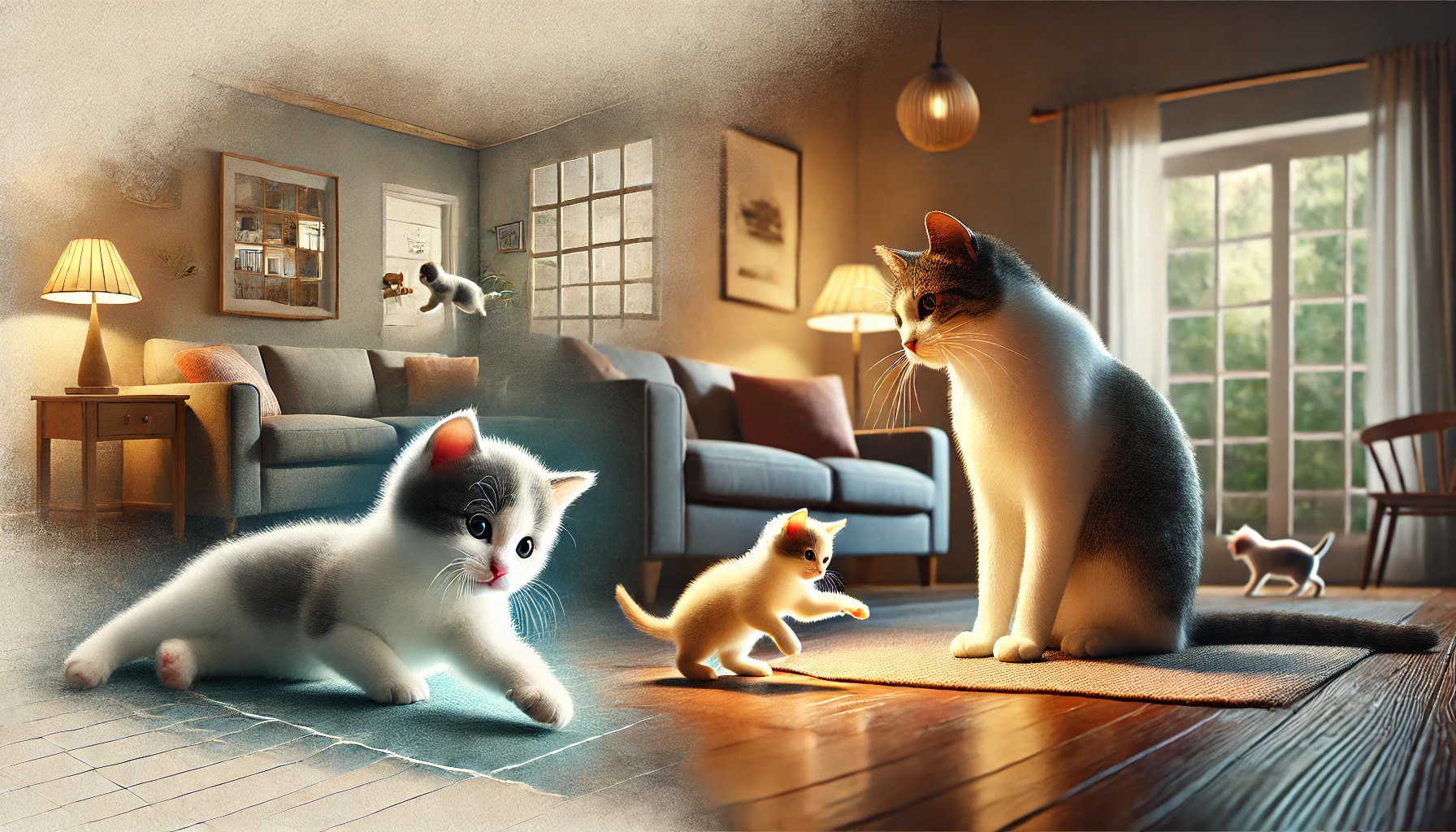
How Early Behavior Shapes Adult Cats
Did you know that a kitten’s early encounters with their mother and siblings define how they will behave later in life?
During the first eight weeks, a kitten learns basic social behaviors such as playing, grooming, and communicating.
These experiences are crucial for their future emotional and behavioral well-being.
If kittens miss this early window of activity, they may develop issues like anxiety or aggression as adults.
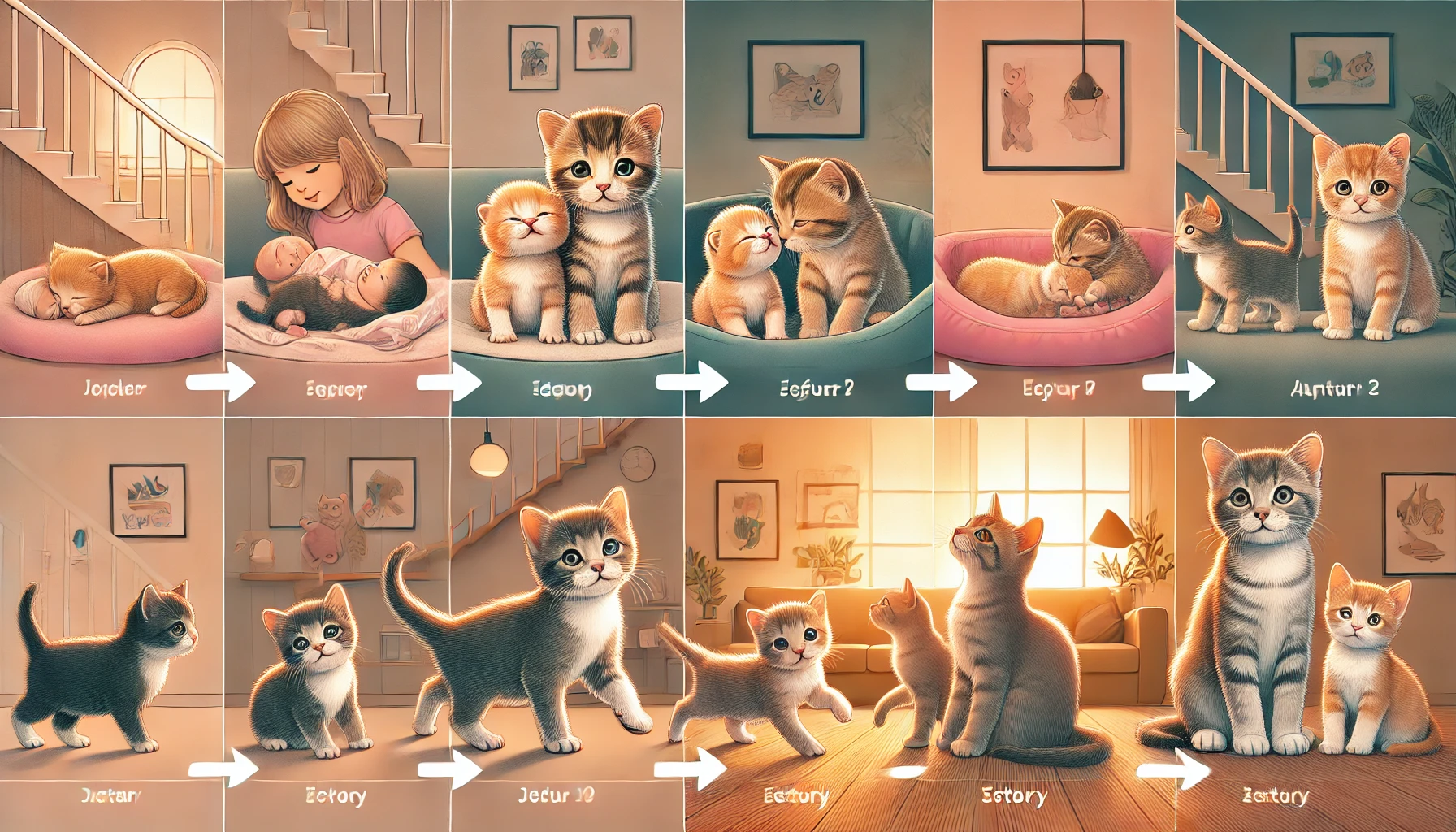
Stages of Kitten Development
Kittens go through several developmental stages, each introducing new behaviors:
- Neonatal Stage (0-2 weeks): Kittens cannot see or hear and are completely dependent on their mother.
- Transitional Stage (2-4 weeks): Their eyes and ears open, and they begin to become aware of the world around them.
- Socialization Stage (4-12 weeks): Kittens begin to interact with people and other animals, learning important social behaviors.
- Juvenile Stage (3-6 months): Play behavior peaks as kittens become more independent and curious about their environment.
Each stage of development is vital in helping kittens grow into emotionally well-rounded and healthy adult cats.
Kittens experience rapid changes during their first months of life, learning critical behaviors for survival and social interaction.
Early development lays the foundation for a confident, healthy adult cat.

Socialization of Kittens: The Most Critical Early Interaction
One of the most important aspects of kittens’ lives is the socialization process.
Kittens are extremely impressionable in the first weeks of life, during which they start developing lifelong relationships with their surroundings, humans, and other animals.
This period is often termed the ‘socialization window‘ because it lays the foundation for the lifelong behavioral patterns of the cat.
If kittens experience positive factors early enough, they will grow into friendly, easygoing adult cats.
Kittens deprived of these necessary interactions might become fearful, aggressive, or excessively timid.
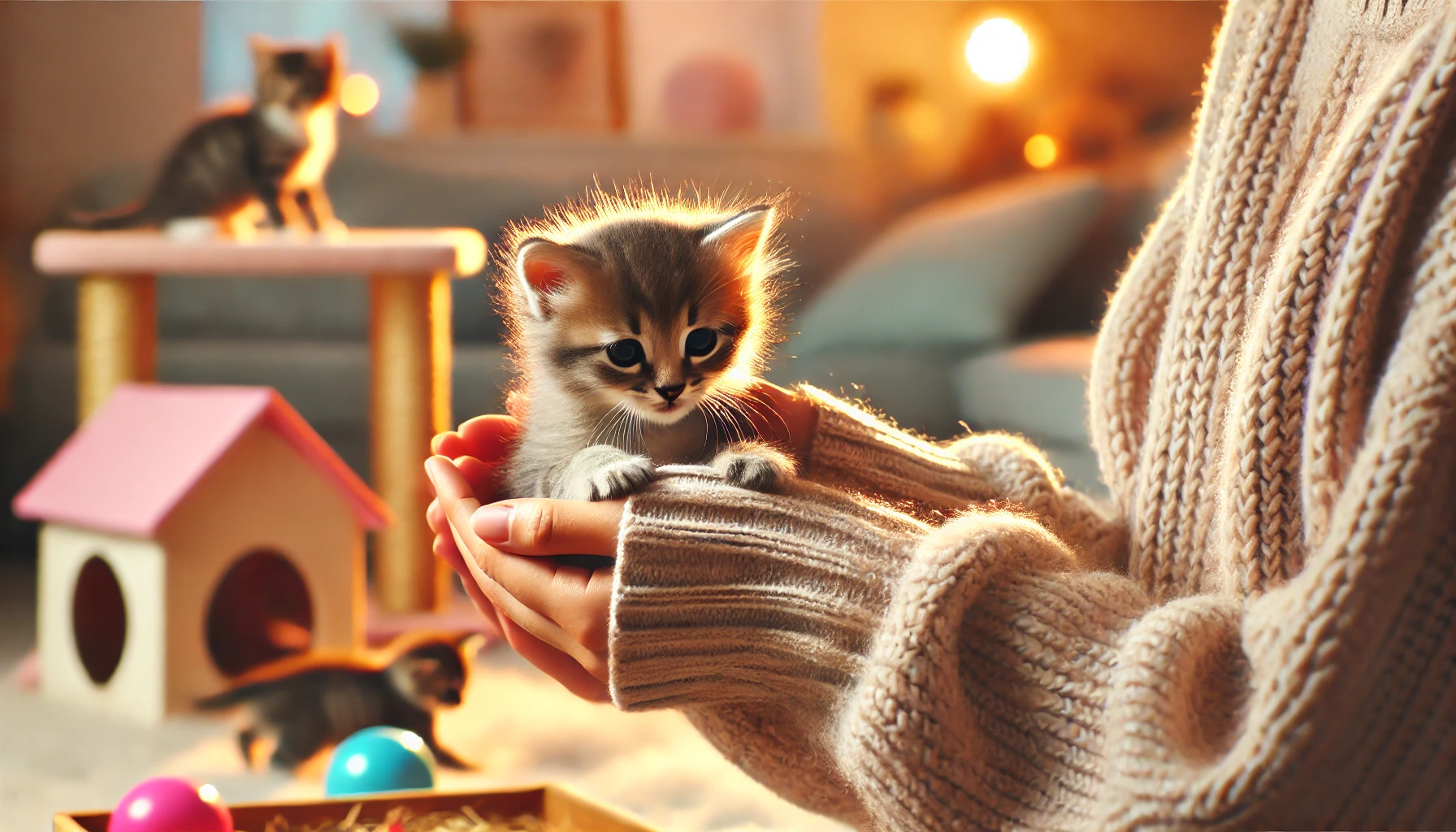
The Role of Early Socialization
Socialization is the process whereby kittens learn about the world through a series of interactions.
Positive experiences during this period allow the kitten to trust people, get along with other animals, and behave confidently in new situations.
The ideal age range for kitten socialization is typically between 3 and 9 weeks of age.
If you expose your kittens to various types of people, handle them gently, and introduce them to different household sounds, they will be easier to handle as adults.
Kittens that are isolated during this period may develop behavioral problems later, such as fear of strangers or reluctance to engage with new situations.
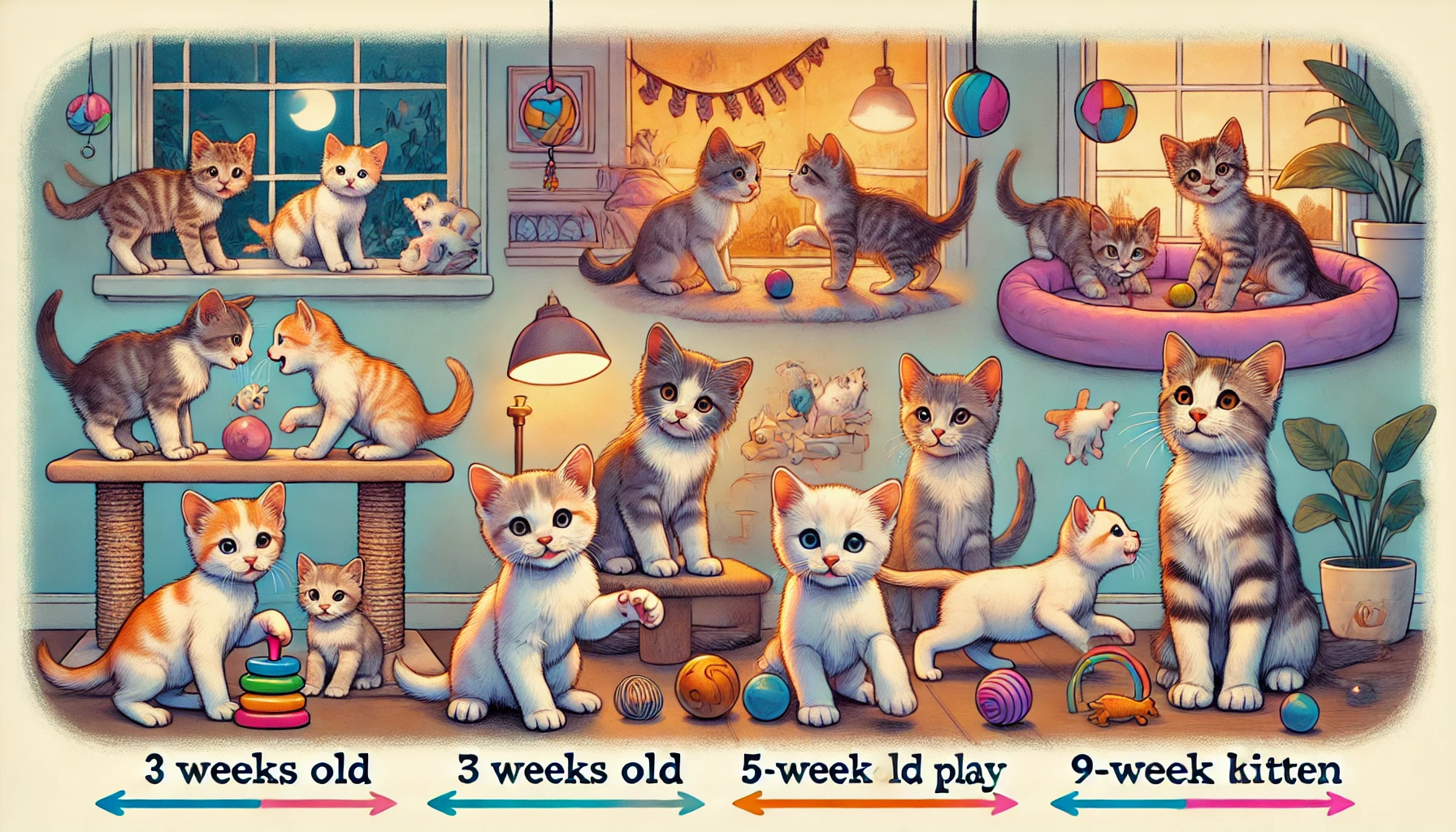
Key Social Behaviors at Different Ages
As kittens go through their socialization phase, they exhibit different key behaviors at each stage:
- Weeks 3-5: Kittens begin exploring their environment, interacting with littermates, and becoming aware of humans as part of their surroundings.
- Weeks 5-7: Play becomes a great form of learning. Kittens engage in mock hunting and display fighting behaviors, which enhance their coordination and social skills.
- Weeks 7-9: Kittens become a bit more independent at this stage but still require social learning from their littermates and human caregivers. They also begin to develop preferences for certain types of play or interaction.

Signs of Proper Social Development
Well-socialized kittens display several behaviors indicative of healthy social development:
- They approach humans without fear and easily interact with them.
- They confidently play with toys, littermates, and humans.
- They can be left alone for short periods without showing signs of distress.
- They adapt easily to new environments, such as different rooms or households.
Proper kitten socialization ensures that your kitten will grow into a well-rounded adult cat, prepared to face and enjoy everyday life.
Socialization in early life is vital to shaping positive lifelong behavioral patterns.
Proper socialization helps kittens become well-adjusted, friendly, and confident adult cats.
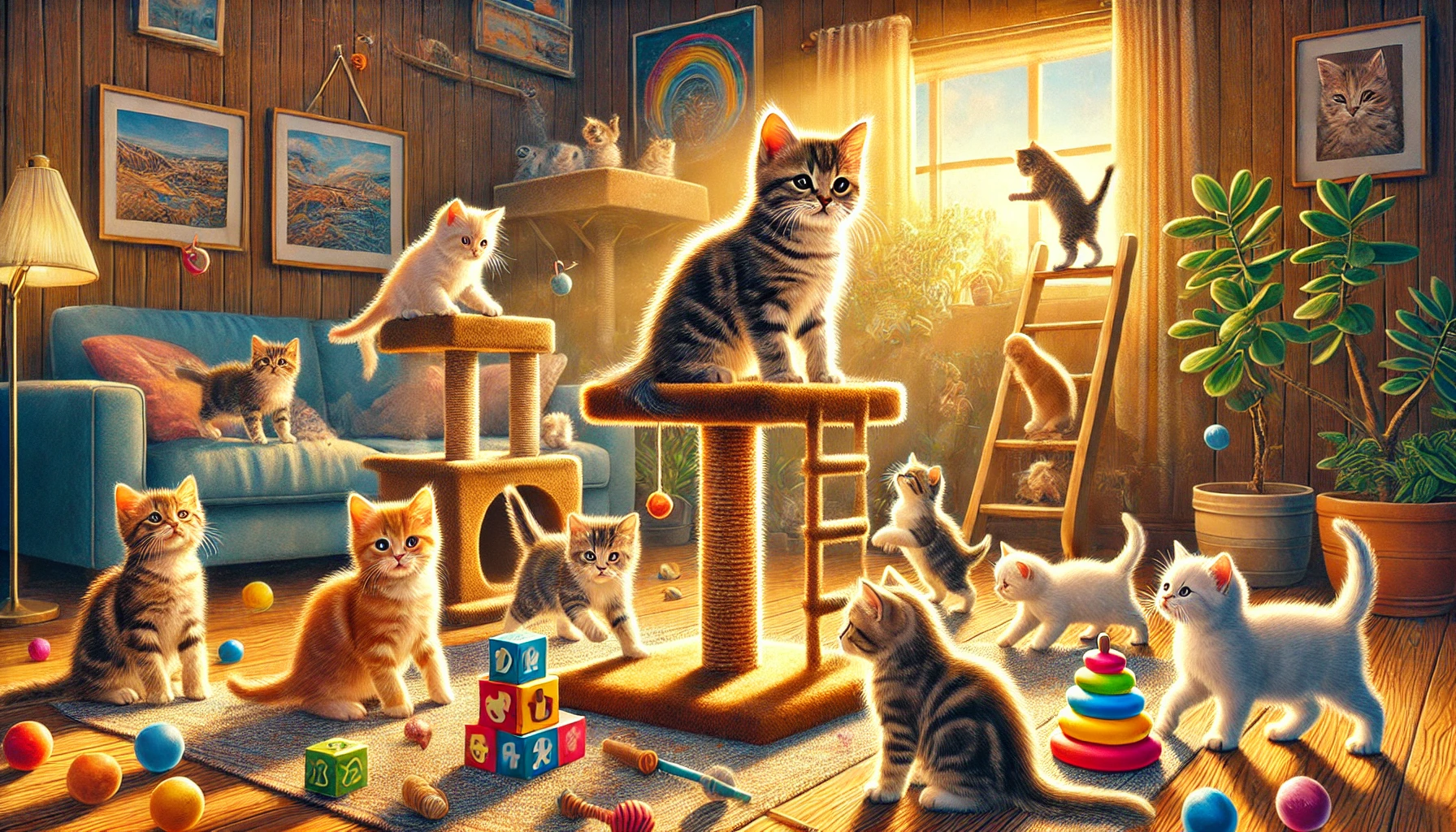
Play and Exploration: Steps of Kitten Learning
Play and exploration are two building blocks on which kittens grow to ensure that their development becomes both cognitive and physical.
Kittens love to play to develop critical survival skills such as hunting, stalking, and pouncing, which prepare them for later stages in life.
Exploration, on the other hand, helps them get familiar with their environment, build confidence, and satisfy their inborn curiosity.
These activities are not just fun but are a significant way for kittens to learn about the world and develop problem-solving abilities.
Kittens that do not engage in enough play or exploration may miss out on important skills required to navigate their environment, potentially leading to behavioral problems later in life.
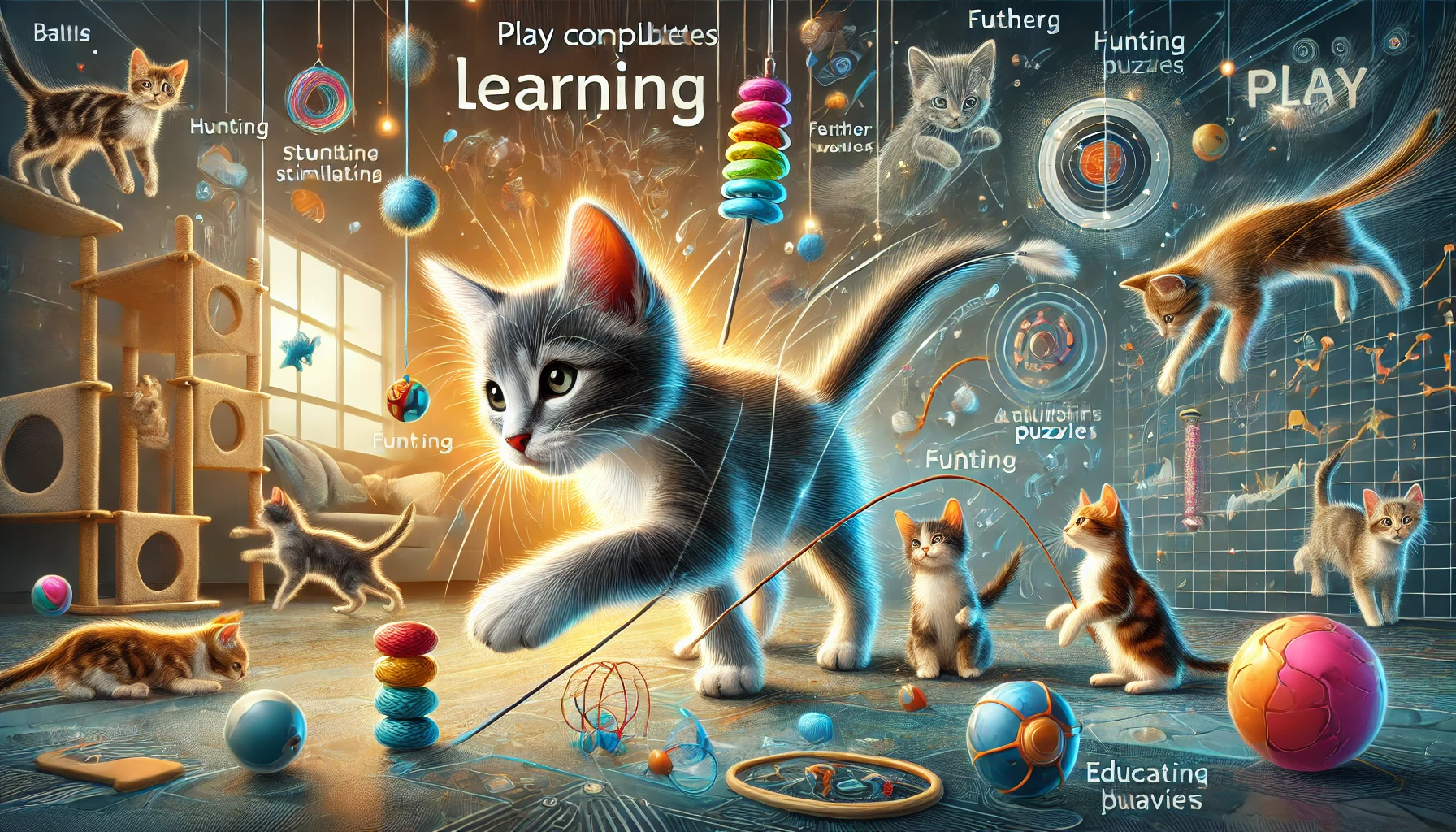
How Play Contributes to Learning
Play is not strictly a source of amusement for kittens; it is the foundation upon which development occurs.
During play, kittens develop and rehearse the skills they will use as adult cats, such as hunting, chasing, and pouncing.
While these behaviors may appear playful, they are crucial for developing motor skills, coordination, and problem-solving abilities.
Social play with littermates, in particular, teaches bite inhibition and sets the limits for physical interaction, helping to prevent aggression in adulthood.
For kittens, play is an instinctive method of learning how to survive.
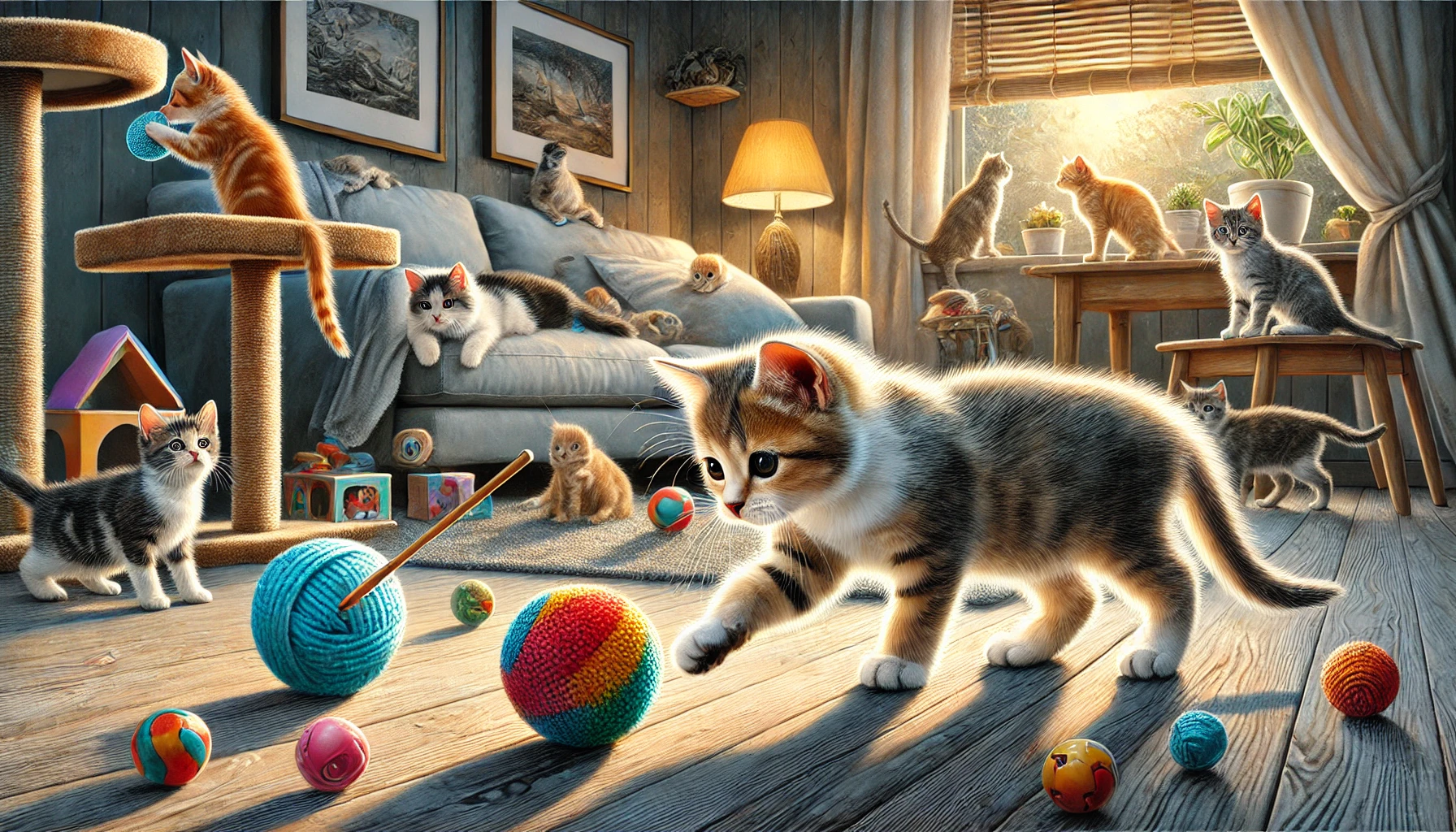
Exploratory Behaviors and Curiosity
Curiosity is an instinctive trait in kittens, and they build their learning processes through exploratory behaviors.
As kittens grow, they become more independent and begin to explore beyond their comfort zone.
These explorations help them develop spatial awareness, adaptability, and confidence in new environments.
Curiosity-driven behaviors like sniffing, climbing, and investigating new objects or places challenge their brains and foster problem-solving skills.
Providing your kitten with a safe, stimulating environment that includes toys, tunnels, and cat trees will help them grow into a confident, well-adjusted adult cat.
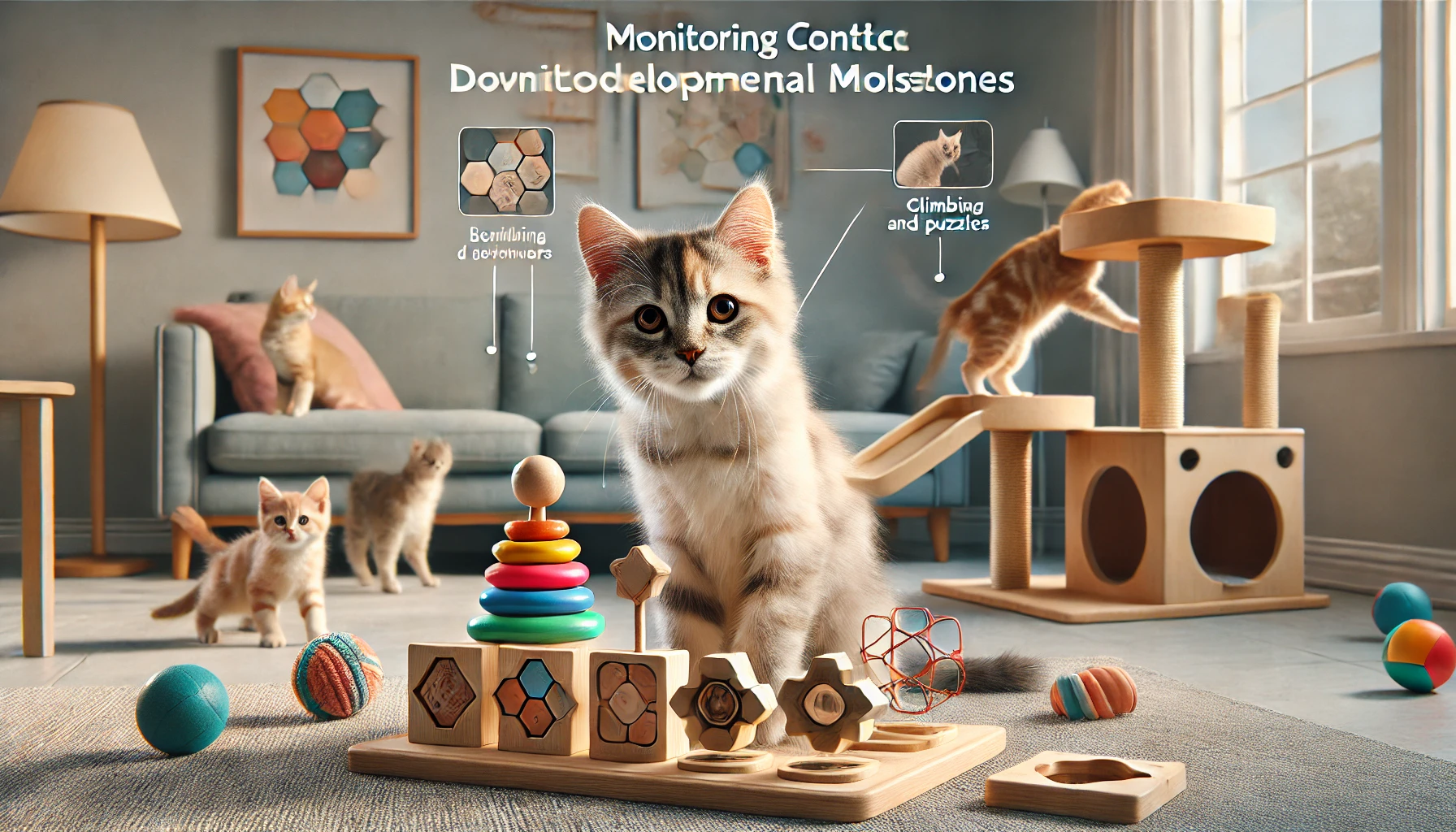
Monitoring Cognitive Developmental Milestones
As kittens continue playing and exploring, you can track distinct milestones in their cognitive development, including:
- Weeks 4-5: Kittens start showing active interest in toys and play, signaling the onset of problem-solving abilities.
- Weeks 6-7: Physical coordination and balance improve, allowing kittens to chase and pounce with greater precision.
- Weeks 8-9: Individual differences in play preferences begin to emerge, along with increased independence in exploration.
- Weeks 10-12: Kittens become bold explorers, investigating new rooms and environments with confidence.
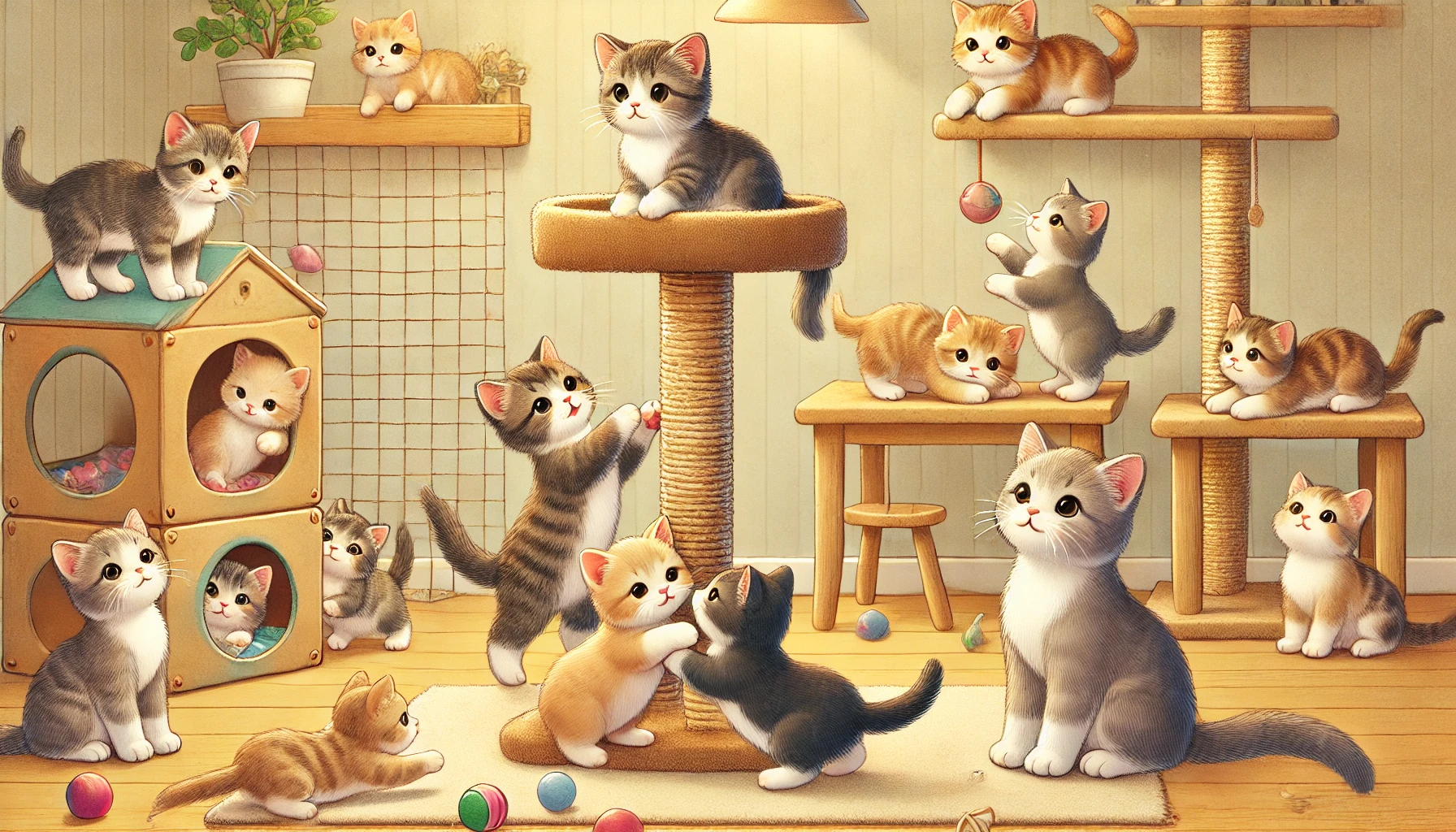
The Role of Playmates in Development
Littermates and other household animals serve as excellent playmates, playing a crucial role in a kitten’s social and cognitive development.
Through play, kittens learn to set boundaries, build communication skills, and establish trust.
Playing with other kittens or animals provides essential physical and mental stimulation, teaching them how to interact with others in a friendly and non-aggressive way.
For single kittens, interactive play with humans is essential to replicate the benefits of social play and ensure they receive adequate mental and physical stimulation.
Play and exploration are essential for developing a kitten’s cognitive and physical abilities.
These activities enhance motor skills, problem-solving abilities, and confidence.

Recognizing Emotional and Behavioral Problems in Kittens
Kittens, like other animals, are not exempt from emotional and behavioral problems throughout the course of their development.
If these problems are not addressed at an early age, they may persist into adulthood, affecting the kitten’s overall wellness.
Early recognition of distress signals in your kitten is crucial to prevent the permanence of behavioral issues.
These problems can manifest through fear, anxiety, aggression, and destructive behaviors.
Recognizing these signs and knowing how to address them is essential to ensure that your kitten grows into a well-rounded and emotionally stable adult cat.

Anxiety or Fear Signals in Kittens
Fear and anxiety are among the most common emotional problems a kitten can experience, especially if they are not properly socialized or have gone through a traumatic event.
Some common signs of fear or anxiety in kittens include:
- Hiding or avoiding human interaction.
- Excessive meowing or vocalization, especially when alone.
- Trembling or crouching with a puffed-up tail.
- Avoiding eye contact or appearing overly cautious when exploring new spaces.
If anxiety is allowed to build up in kittens, it can lead to severe behavioral issues such as aggression or long-lasting fear of humans and other animals.
Early intervention is essential to help them overcome these issues.

Common Behavioral Issues in Kittens
Kittens, while naturally playful and curious, can sometimes develop problematic behaviors.
These issues may arise from a lack of proper guidance, insufficient socialization, or environmental stress.
Common behavioral issues in kittens include:
- Aggression: Kittens may show aggressive behaviors such as biting or scratching during play, often due to overstimulation or rough play without boundaries.
- Destructive Behavior: Scratching furniture, knocking over objects, or chewing inappropriate items could be due to boredom or pent-up energy.
- Litter Box Issues: Inconsistent use of the litter box may indicate stress, anxiety, or an underlying medical condition that requires attention.
Addressing these behaviors early is important to prevent them from continuing into adulthood, where they may be more difficult to manage.
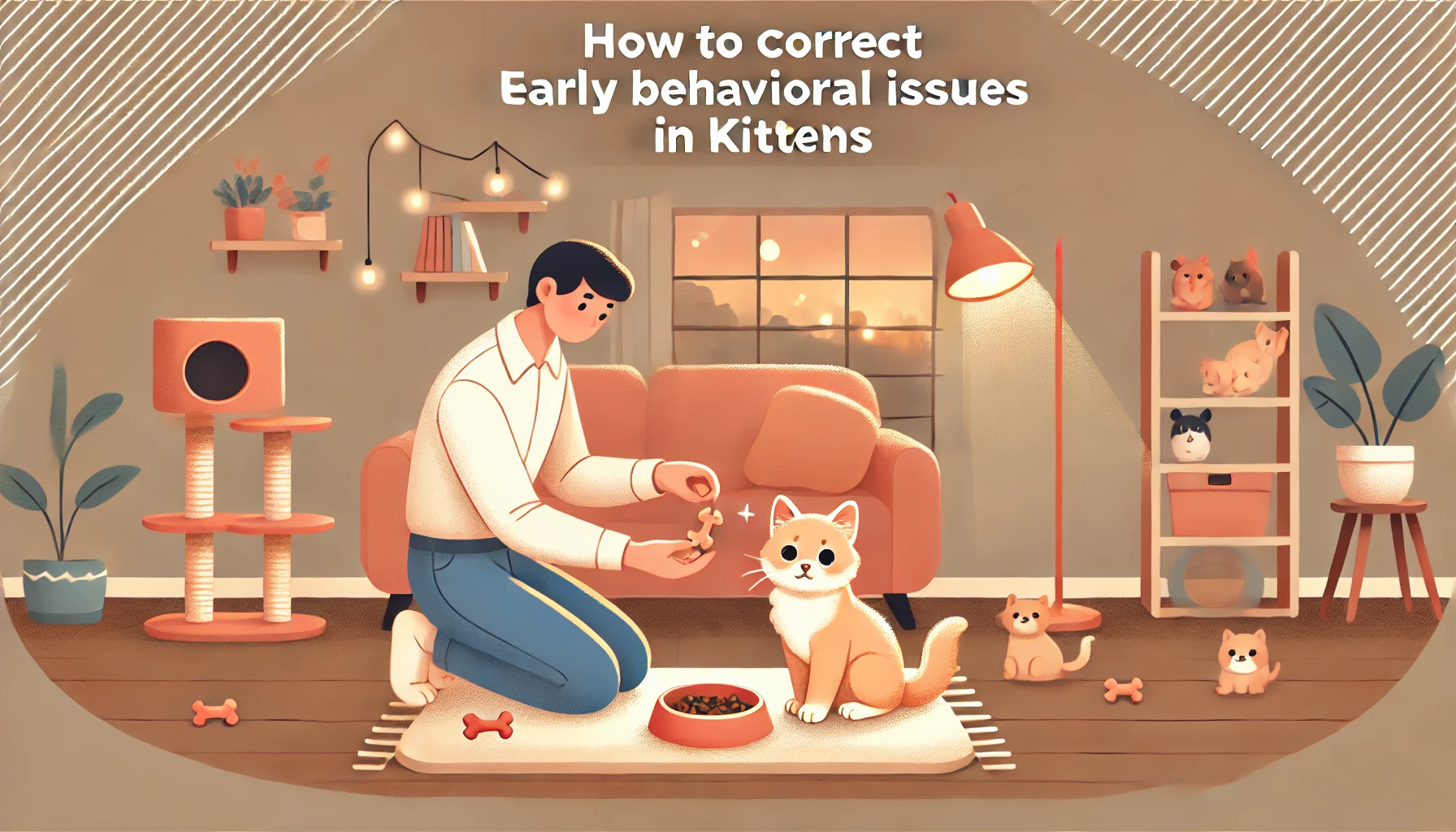
How to Correct Early Behavioral Issues
Kitten behavioral problems can be prevented and corrected with patience and understanding.
Here are some steps to address early emotional or behavioral issues:
- Positive Reinforcement: Rewarding good behavior with treats or praise encourages your kitten to repeat these actions.
- Socialization: Gradually exposing your kitten to new people, animals, and environments can reduce fear and anxiety, making them more adaptable.
- Interactive Play: Providing plenty of playtime can prevent boredom-related destructive behaviors and foster healthy mental and physical development.
- Veterinary Consultation: If behavioral issues persist, consult a veterinarian to rule out any underlying medical conditions that may be contributing to the problem.
By addressing these issues early, you can help your kitten develop into a joyful and well-adjusted adult cat, ensuring a closer bond between you and your feline companion.
It’s important to recognize and address behavioral problems early to prevent them from persisting into adulthood.
Common signs include fear, anxiety, and aggression.
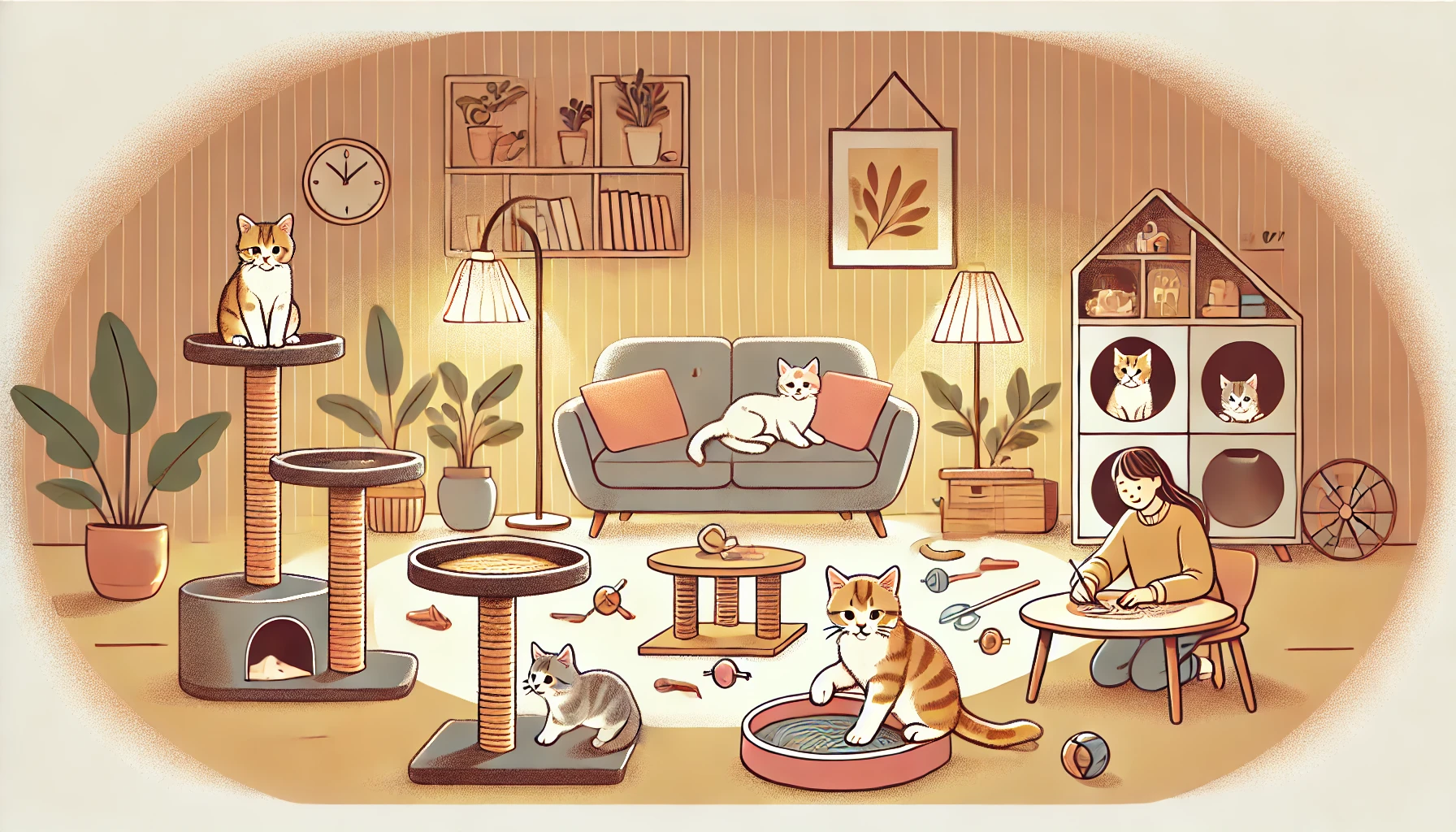
Supporting Healthy Kitten Development at Home
Setting up a safe, comfortable home environment is crucial for the healthy development of kittens.
While the first weeks of their lives are filled with exploration and learning, it is the environment you create at home that determines their growth, behavior, and emotional well-being.
A kitten’s home needs a balance of stimulation, comfort, and security, allowing them to explore, play, and rest without feeling overwhelmed.
Ensuring your kitten is well-supported at home forms the foundation for their long-term health and happiness.

Creating a Safe and Stimulating Environment
A stimulating environment encourages kittens to explore and learn while fostering healthy physical and cognitive development.
Here are key elements to include in your kitten’s environment:
- Toys: Provide a variety of toys that stimulate curiosity and interactive play. Toys like balls, feather wands, and puzzle toys will keep them engaged.
- Scratching Posts: Scratching is an instinctive behavior for kittens. Scratching posts and cat trees protect your furniture and give your kitten an outlet for their natural instincts.
- Hideaways and Safe Spaces: Ensure your kitten has cozy hideaways to retreat to when they need privacy or rest.
- Climbing Structures: Cats are natural climbers, so providing safe climbing structures, such as cat trees, helps with physical growth and exercise.
Maintaining a clean, safe environment for your kitten to explore, along with mental and physical stimulation, will help them build confidence and develop good habits.

Using Toys and Play to Support Growth
Playtime is essential for a kitten’s development, both physically and mentally.
Toys help develop coordination, problem-solving skills, and social bonding between you and your kitten.
Consider these tips for maximizing the benefits of play:
- Rotate Toys: Keep playtime exciting by rotating toys to prevent boredom and stimulate curiosity.
- Interactive Play: Engage in regular play with your kitten using items like laser pointers, feather wands, and interactive puzzles to promote bonding and mental stimulation.
- Independent Play Options: Provide toys that your kitten can play with independently, such as balls or stuffed animals, to keep them entertained when you’re not available.
By incorporating both interactive and solo play, you ensure that your kitten gets the physical exercise and mental stimulation they need for healthy development.
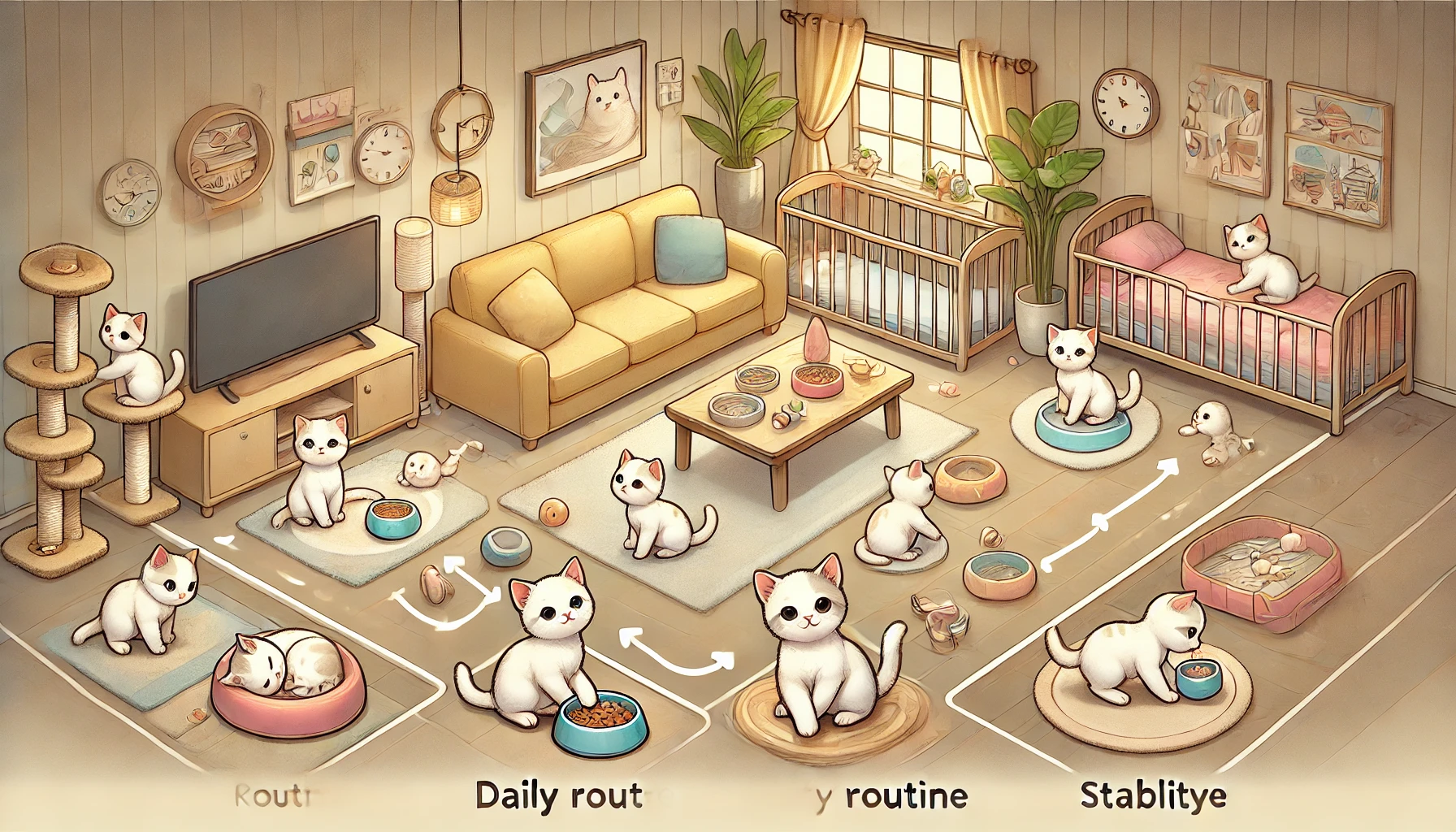
Routine and Stability are Important
Kittens thrive in environments with routine and stability.
A consistent daily routine helps your kitten feel secure and learn what to expect at different times of the day.
Regular feeding times, play sessions, and sleep schedules will help your kitten develop healthy habits.
Sudden changes in routine can cause stress, so maintaining predictability ensures your kitten remains emotionally balanced.

Nutrition’s Role in Behavioral Health
Nutrition plays a vital role in supporting healthy kitten development.
A well-balanced diet not only promotes physical health but also has a significant impact on your kitten’s behavior.
Poor nutrition can lead to lethargy, irritability, or even hyperactivity.
Ensuring your kitten receives the right balance of proteins, fats, vitamins, and minerals is crucial for their growing body.
- High-Quality Kitten Food: Feed your kitten nutritious meals specially formulated for kittens to meet their dietary needs.
- Feeding Schedule: Establish a regular feeding schedule to support digestion and create a pattern your kitten can follow.
- Fresh Water: Ensure your kitten always has access to fresh, clean water to stay hydrated and healthy.
Providing a nutritious diet not only supports your kitten’s physical well-being but also contributes to positive behavior and overall healthy development.
A safe, stimulating home environment is crucial for fostering healthy physical and emotional development in kittens.
Providing toys, scratching posts, and stable routines promotes well-rounded growth.
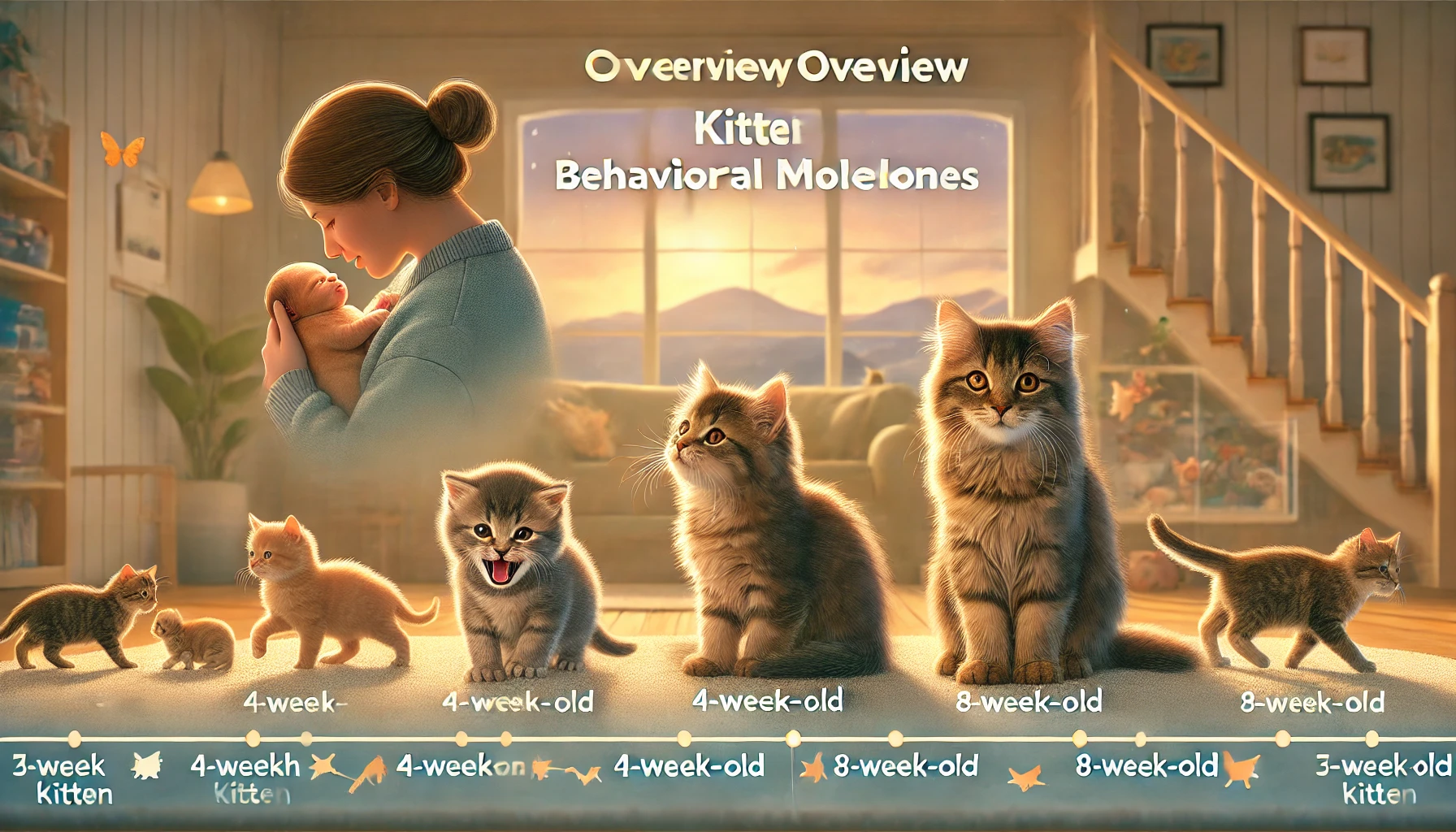
Overview of Kitten Behavioral Milestones
Understanding and supporting kitten behavioral milestones can mean the difference between a sad, anxious cat and a happy, well-adjusted one.
From their earliest days, kittens undergo crucial stages in their development that affect not only their physical growth but also their cognitive and emotional maturing.
By recognizing these milestones, creating the right environment, and nurturing your kitten’s natural instincts, you will set the foundation for your kitten to grow into a healthy adult cat.
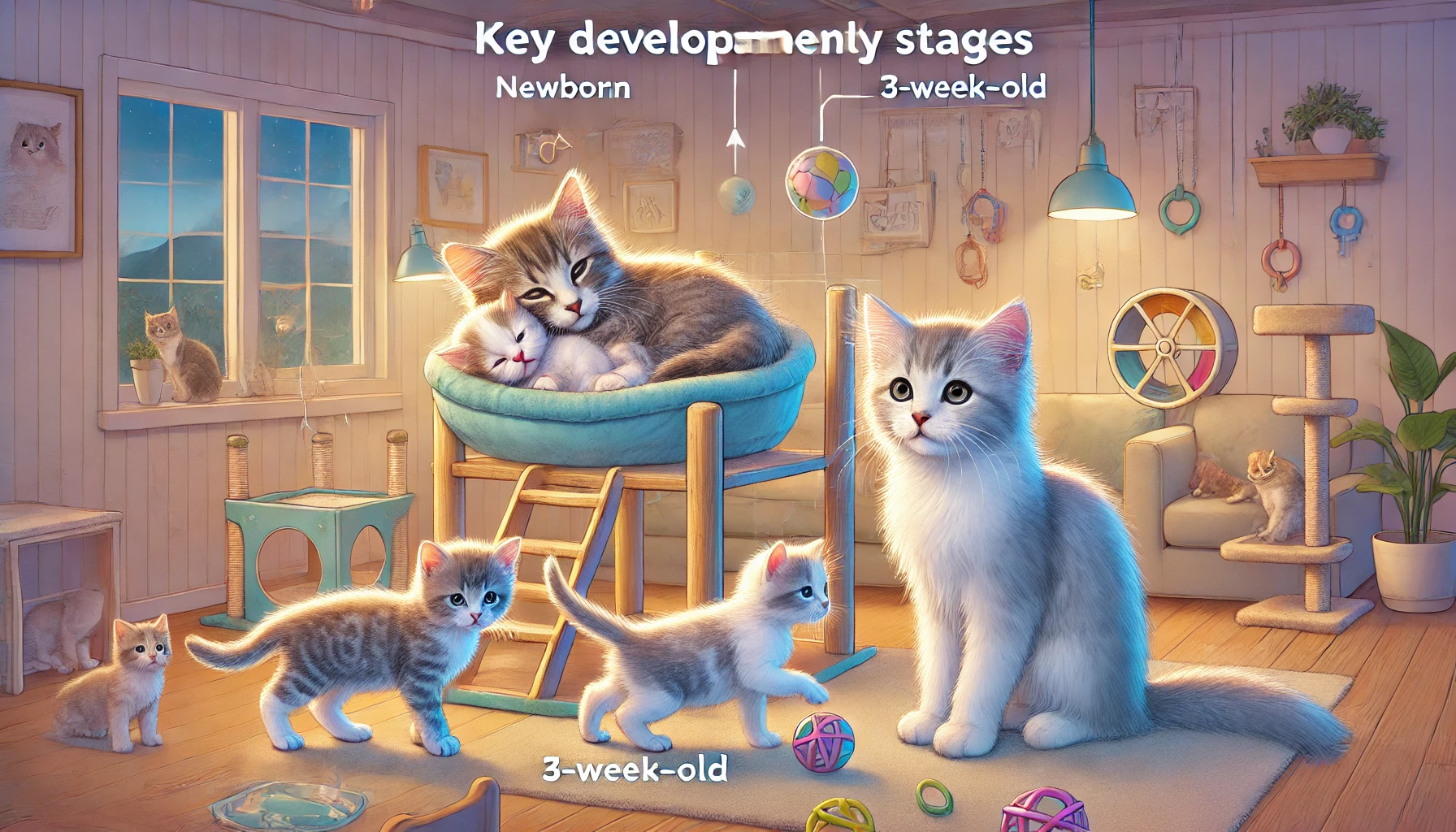
Understanding Key Developmental Stages
The first few months of a kitten’s life are marked by significant changes.
During the neonatal stage, the kitten relies entirely on the mother for survival.
As they move into the transitional stage, they begin to open their eyes and ears and become more aware of their surroundings.
The socialization stage is a critical phase where kittens learn how to interact with humans, other animals, and their environment.
Finally, in the juvenile stage, play and exploration strengthen both their intellectual and physical abilities.

The Need for Play and Exploration
Play and exploration are not just forms of entertainment for kittens; they are essential for growth and development.
Through play, kittens sharpen their hunting, stalking, and pouncing skills, which are instinctive behaviors needed for survival.
Exploration, on the other hand, builds confidence, adaptability, and problem-solving skills.
A well-stimulated kitten is more likely to grow into a confident and curious adult cat.

Addressing Emotional and Behavioral Challenges
Recognizing and addressing emotional and behavioral challenges early on is crucial to your kitten’s development.
If a kitten is not properly socialized or experiences stress, they may develop fear, anxiety, or aggression as they grow.
These issues can be managed through positive reinforcement, creating a stable environment, and consulting a veterinarian when necessary to prevent long-term behavioral problems.

Supporting Healthy Development at Home
Your home is a vital factor in your kitten’s growth.
A safe and stimulating environment encourages play and exploration while providing comfort and security.
Adding climbing structures, scratching posts, and interactive toys will enhance their physical and mental development.
Additionally, a well-balanced diet designed for their growing body not only promotes physical health but also supports positive behavior and emotional well-being.
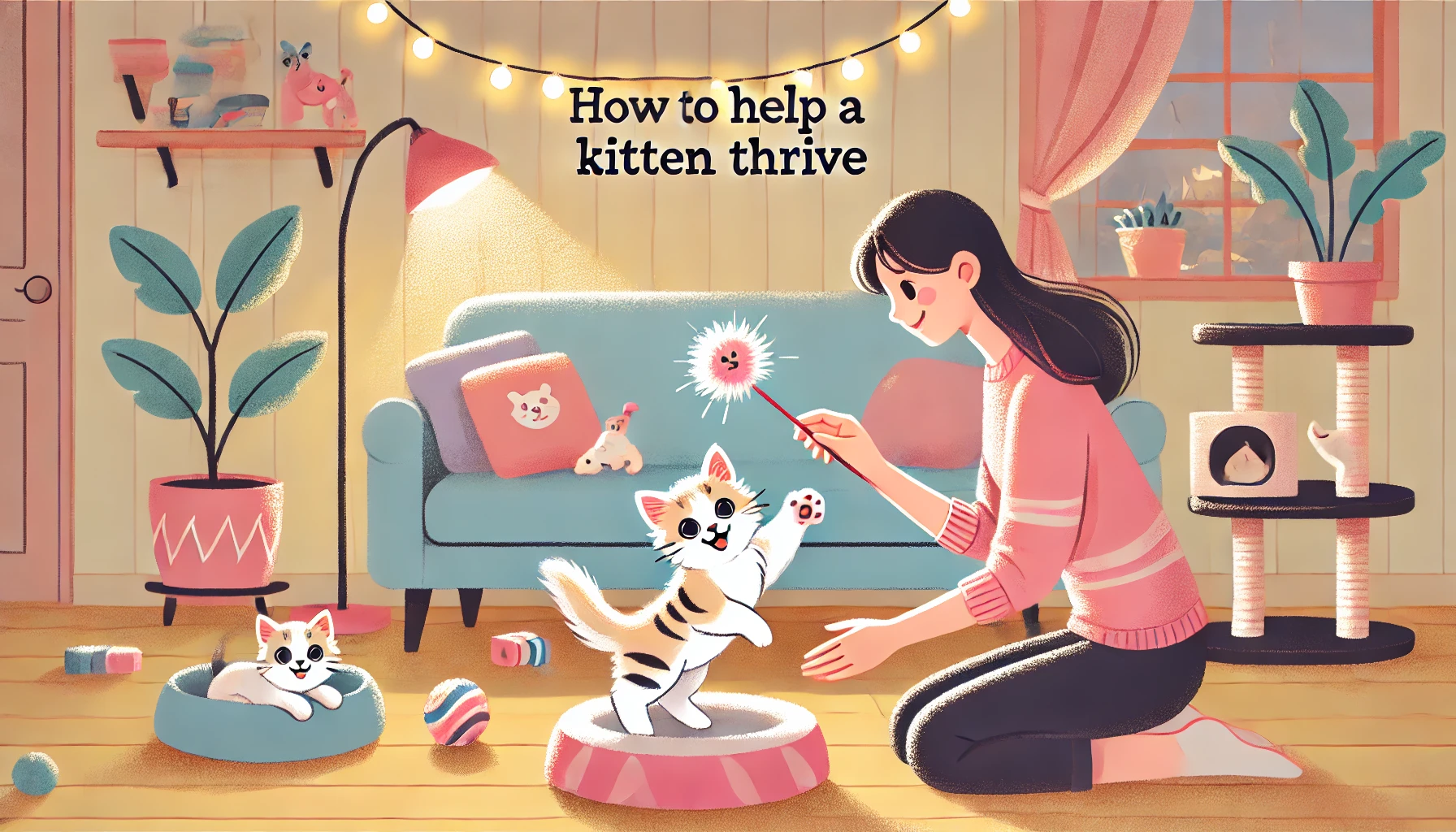
Helping Your Kitten Thrive
Understanding kitten behavioral milestones is essential for guiding your kitten from a playful youngster to a well-adjusted adult cat.
A safe, stimulating, and nurturing environment will help them develop confidence and healthy behaviors.
With proper care, attention, and love, your kitten will grow into a happy companion who will bring joy to your home for years to come.
Understanding and supporting each developmental stage is key to raising a well-adjusted, healthy adult cat.
From neonatal to juvenile, every phase is essential for their behavioral growth.
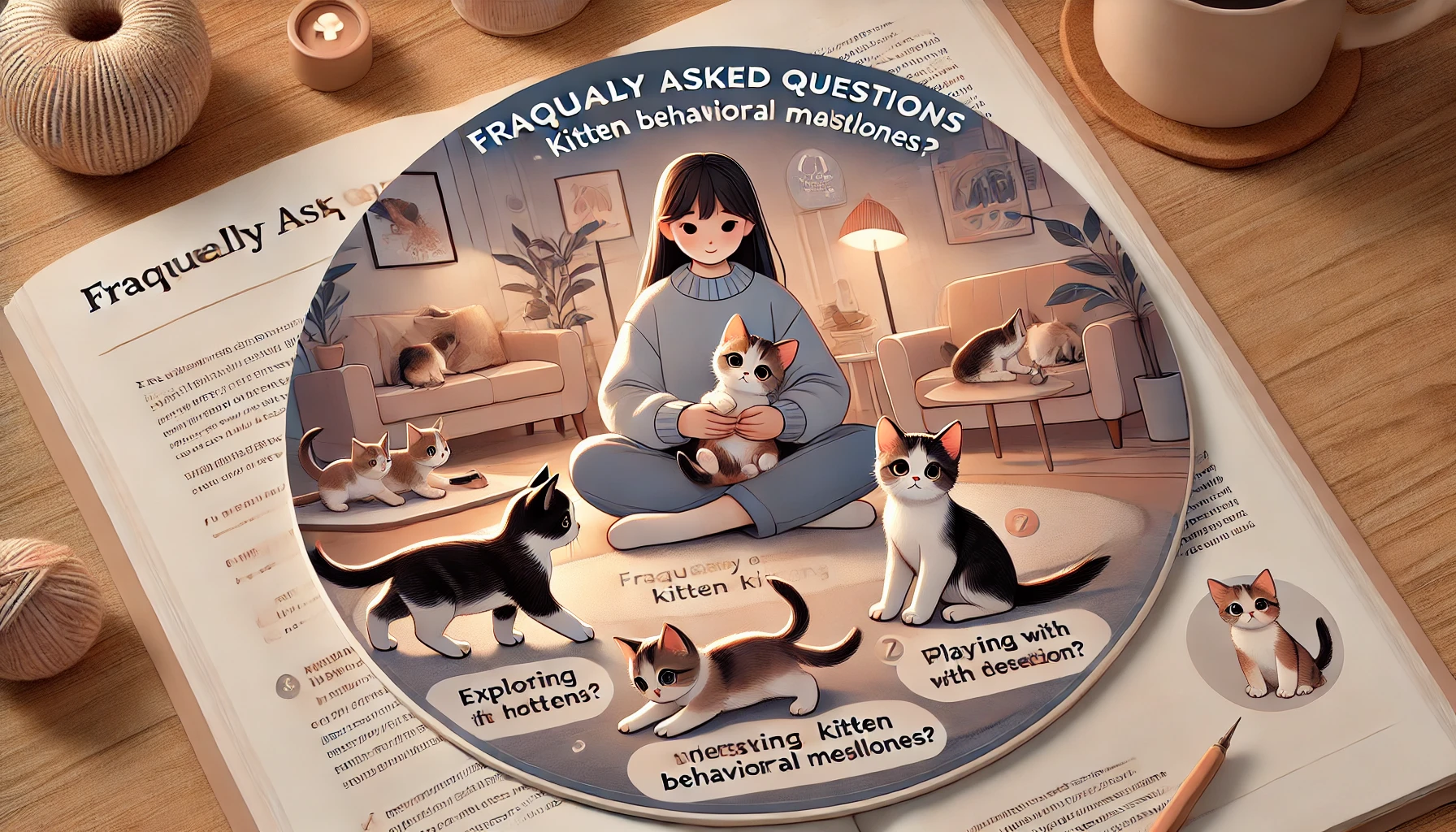
Frequently Asked Questions About Kitten Behavioral Milestones
Below are common questions asked by pet owners about kitten behavioral milestones, why they are important, and how to best support typical development.
Understanding these questions will help you raise a healthy, well-adjusted adult cat.
What are the critical periods in kitten behavioral development?
The neonatal, transitional, socialization, and juvenile stages are all important.
Each stage plays a vital role in the physical, emotional, and cognitive development of kittens.
How important is play in the life of a kitten?
Play is essential for kittens as it helps them develop cognitive and physical capabilities, such as motor skills, problem-solving abilities, and social behaviors like hunting and pouncing, which are crucial for their overall development.
My kitten is fearful or anxious; what do I do?
Provide a stable, calm environment, use positive reinforcement, and gradually socialize your kitten with new people and environments.
If the fear or anxiety persists, consult a veterinarian for further guidance.
How can I support the socialization process of my kitten?
Socialize your kitten by introducing them to new people, other animals, and various environments during the socialization window.
Handle your kitten gently and create positive experiences to build trust and confidence.
What type of toys are best for kitten development?
The best toys for kitten development include interactive play items like balls, feather wands, and puzzle toys that promote physical activity, mental engagement, and cognitive growth.
How do I address destructive behaviors in kittens?
Destructive behaviors can result from boredom or pent-up energy.
Provide plenty of toys, interactive play sessions, and ensure your kitten has appropriate outlets for scratching and climbing.
Why is routine important to a kitten’s development?
A consistent routine helps kittens feel secure and reduces stress.
Regular feeding times, play sessions, and sleep schedules foster healthy habits and emotional stability in growing kittens.
How does nutrition affect the behavior of a kitten?
A well-balanced diet supports both physical growth and behavioral health.
Proper nutrition gives your kitten the energy and nutrients they need to develop emotionally and cognitively.
What should I feed my kitten?
Feed your kitten high-quality, nutrient-rich food that is specially formulated for kittens.
This food should contain the right balance of proteins, fats, vitamins, and minerals to support their growing body.

